
The lure of lower costs often draws businesses to offshore software development. It’s easy to assume that code is code, deadlines are universally met, and language will be the only communication hurdle. But the reality for many unfolds quite differently. Projects can get stuck when deadlines are not met. Cultural misunderstandings can cause problems, and initial cost savings can quickly disappear due to unexpected issues.
To make smart outsourcing decisions in 2025, you need to look beyond the price tag. We're here to break down the best countries to outsource software development and highlight what truly makes them stand out.
For 15 years, Stfalcon, based in Ukraine, has been helping clients worldwide create successful custom software solutions. We guide them through complex challenges to achieve their goals. Our experience has taught us an important lesson: there is no single "best" country. It depends on how well a country matches your individual needs and goals.
How to Choose the Right Outsourcing Partner
Choosing the right outsourcing destination is only half the battle. Choosing the right partner in that country can be the key difference between a successful project and a costly problem. Top outsourcing companies can handle challenges in any area, but choosing the wrong partner can ruin even the best plans.
Here's a simple checklist and some key points to consider when choosing a software development partner that meets your needs.
What to Look For:
- A proven track record, backed by relevant case studies and client success stories
- Clear communication and robust project management processes
- Expertise in your specific technology stack and business domain
- Transparent pricing models and a proactive approach to risk mitigation
Questions to Ask Potential Partners:
To dig deeper, pose the following questions:
- "How do you generally handle unscheduled technical problems or scope creep on a project?"
- "Can you explain your typical communications procedure for daily updates and important decisions?"
- "What are the measures you have to safeguard data and intellectual property?"
- "How do you keep your team up-to-date with the latest technologies used in our industry?"
- "Describe one time when your team had to radically alter their strategy to address a client's changing needs or priorities."
Identify a partner who is good at handling changing needs, utilizing new technologies, and suggesting innovations. Be aware of warning signs, such as generic pricing, incomplete records, or reluctance to share developer bios or credentials.
Read more:
How to Select and Hire a Dedicated Software Development Team
Want a web app that does more?
Let's build a solution that's smart, sleek, and powerful.
Alina
Client Manager

Key Criteria for Choosing an Outsourcing Location in 2025
When choosing where to outsource, it is more important to get the best value for your money than to get the lowest cost. The wrong choice can lead to communication issues, legal problems, or a talent mismatch that will hamper your project. To make a well-informed decision, the following are the most critical factors to take into account:
Cost vs. Value
Hourly fees are important, but they only account for part of the picture. It is possible to have a lower initial cost but pay more in the long run. Missed deadlines, subpar code quality, or excessive revisions waste your budget. Rather than simply considering the price, consider the total cost of ownership (TCO) as well. It includes hidden expenses such as project management, communication issues, and maintenance costs. A slightly higher rate in a country with experienced developers and strong quality control may save you money over time.
Talent Pool & Expertise
For particular technologies, some nations have emerged as preferred hubs. Blockchain, AI, and fintech are major topics in Eastern Europe. India is a leader in cloud computing and enterprise software. Mobile development is an area in which Latin America is becoming increasingly proficient. Additionally, Southeast Asia is becoming a leader in e-commerce and healthtech. Selecting a region with demonstrated expertise in a particular field can be crucial if your project calls for a specialized skill set, such as cybersecurity solutions, AI-driven analytics, or Flutter for mobile apps.
Time Zone & Collaboration
Time zone differences can either improve productivity or create major bottlenecks. If you need real-time collaboration, working with a country that has overlapping hours with your business is crucial. Eastern European teams work well with companies in Western Europe and some parts of the United States. Latin American developers are an excellent match for North American companies. If your project is based on flexible and remote working, having a big time zone difference may not be a problem. Nevertheless, it is still essential to hold daily stand-ups and maintain effective communication.
Legal & IP Protection
Outsourcing is the sharing of confidential information and proprietary content. It is therefore crucial to choose a country with sound legal protection. The UK, Canada, the US, and the European Union are nations with effective intellectual property (IP) protection laws. Ukraine has also made substantial progress towards more business-friendly regulations and IP rights. Some areas do not enforce contracts effectively, which makes it not advisable to outsource projects with valuable intellectual properties. Before you sign, always ensure that you understand the non-disclosure agreements (NDAs), local data protection regulations, and the process for resolving disputes.
Cultural Compatibility & Communication
A team that adopts your company's work habits will join your project more easily. Above all, pay attention to English proficiency, attitude towards problem-solving, and overall work habits. Eastern European and Latin American programmers are proactive and open to constructive challenges. Conversely, Asian outsourcing countries tend to focus on structured workflow and efficiency. Understanding these cultural differences will help you choose a partner who will be comfortable with your collaboration style and minimize communication barriers.
By carefully considering these key points, businesses can move beyond simply seeking the lowest price. Instead, they can make wise choices that lead to successful and valuable outsourcing partnerships in 2025.
The Best Countries to Outsource Software Development in 2025
With a clearer understanding of the key criteria, the crucial question remains: what are the best countries to outsource software development in 2025? We have identified several top travel destinations based on our experience and current global trends. Each destination has its strengths and challenges.
Eastern Europe: The High-Quality Tech Hub
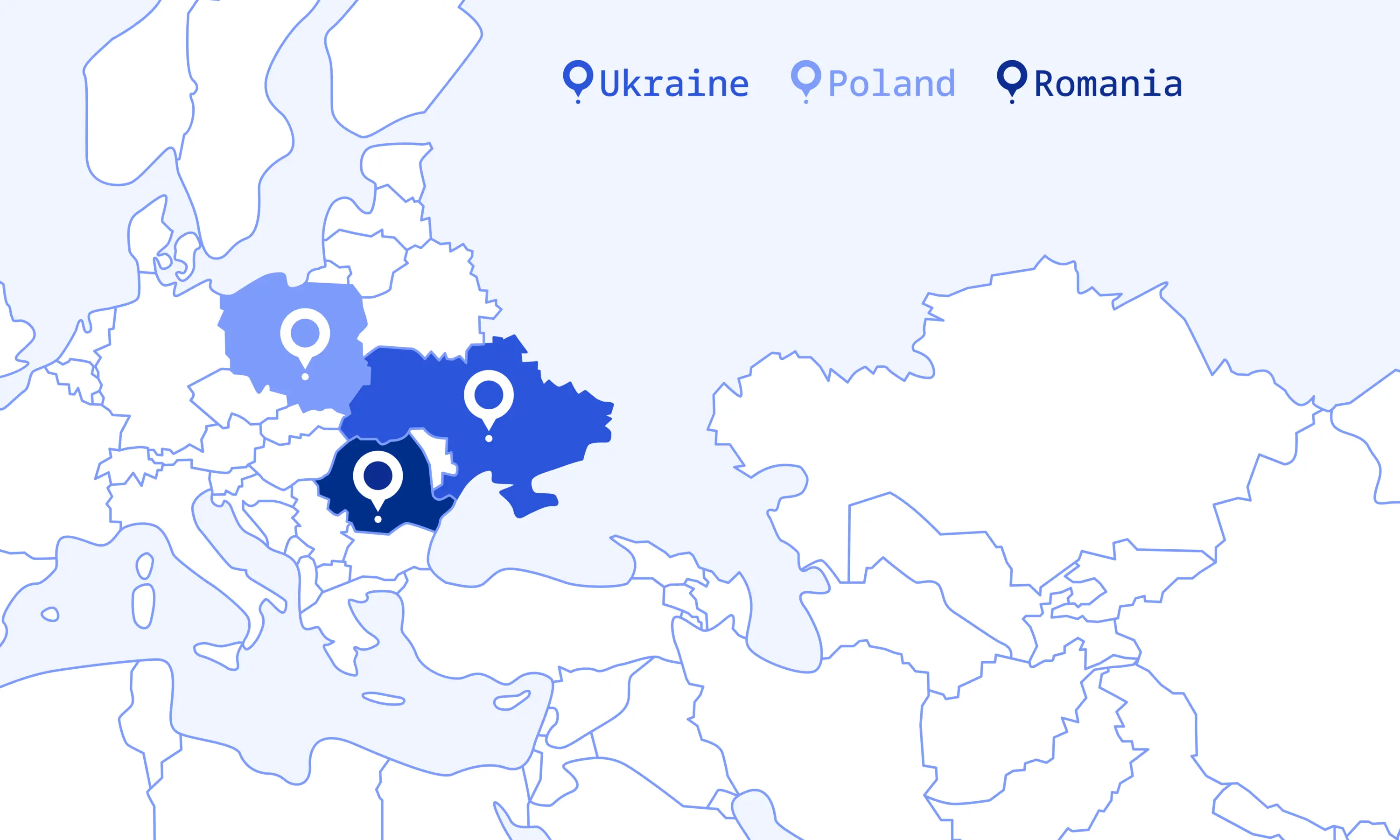
Eastern Europe has become a top choice for businesses looking for skilled software developers. In 2025, it offers a good balance of technical talent, a strong cultural fit with Western practices, and competitive prices. Ukraine, Poland, and Romania are excellent choices for companies seeking to enhance their development and drive innovation. These countries offer a mix of factors that make them very appealing for scaling business capabilities. Today, Eastern European countries collectively represent about 40% of global outsourcing market, with Poland (12.12%) and Ukraine (10.37%) being the leading countries.
Why Eastern Europe?
- Strong Engineering Education. Ukrainian, Polish, and Romanian universities graduate tens of thousands of skilled developers every year. The majority of them are experts in areas such as AI, blockchain, fintech, and enterprise solutions.
- Cultural Alignment with Western Businesses. Western business practices are also well known among developers in this region. This allows for smooth coordination. English language proficiency is generally good, especially in the IT field.
- Competitive Pricing. Eastern Europe has very competitive prices for high-quality software development experts. They spend more than certain Asian countries but less than in Western Europe or North America. You are therefore able to pay for quality.
Poland boasts high pools of talent, access to Western Europe is easy, and it has strong government patronage for the IT sector. Romania, being competitive in terms of price, is on the rise in AI and cybersecurity. Both are good, but Ukraine is better for technical talent, innovation, and affordability.
Ukraine: A Leading Software Development Hub
Among Eastern European countries, Ukraine stands out as one of the best countries for offshore software development. With over 300,000 technical professionals and an affluent IT culture, Ukraine has some of the best dedicated development teams in the world. Ukrainian outsource businesses are well-experienced in fintech, artificial intelligence, healthcare, custom logistics software, and blockchain development.
Despite geopolitical challenges, Ukraine’s IT sector remains one of the most resilient industries in the country. Ukrainian IT companies have adjusted by working fully remotely, using multiple locations, and creating strong backup plans. Clients working with teams in Ukraine continue to receive consistent service. Many companies are even expanding their teams in the region.
Global Companies That Choose Ukraine
- WhatsApp. The company’s early growth depended on Ukrainian engineers, showing the country’s strong technical skills.
- Revolut. The fintech giant has leveraged Ukrainian talent to build key parts of its platform.
- Ring (acquired by Amazon). Ukrainian developers played a crucial role in building the smart home security technology behind Ring’s success.
- MeinFernbus. Stfalcon built a website and mobile app for a major transport service provider in Germany.
Currently, this company operates in 20 European countries on 100,000 different routes. We have built a custom bus booking platform that serves over 8 million passengers.
Our team also developed an application for Ecolines, one of the largest coach operators in Europe. Our task was to create a modern, efficient, and user-friendly app while maintaining brand consistency.
For an American company, ForeFlight, we handled website development for a guide to hidden airports for pilots. For less than 3 years since launch, 65,000 users have already used our Airfield Guide.
Eastern Europe is a smart choice for companies that want to speed up their software development and reach their business goals.
Latin America: The Nearshore Outsourcing Advantage for US Companies
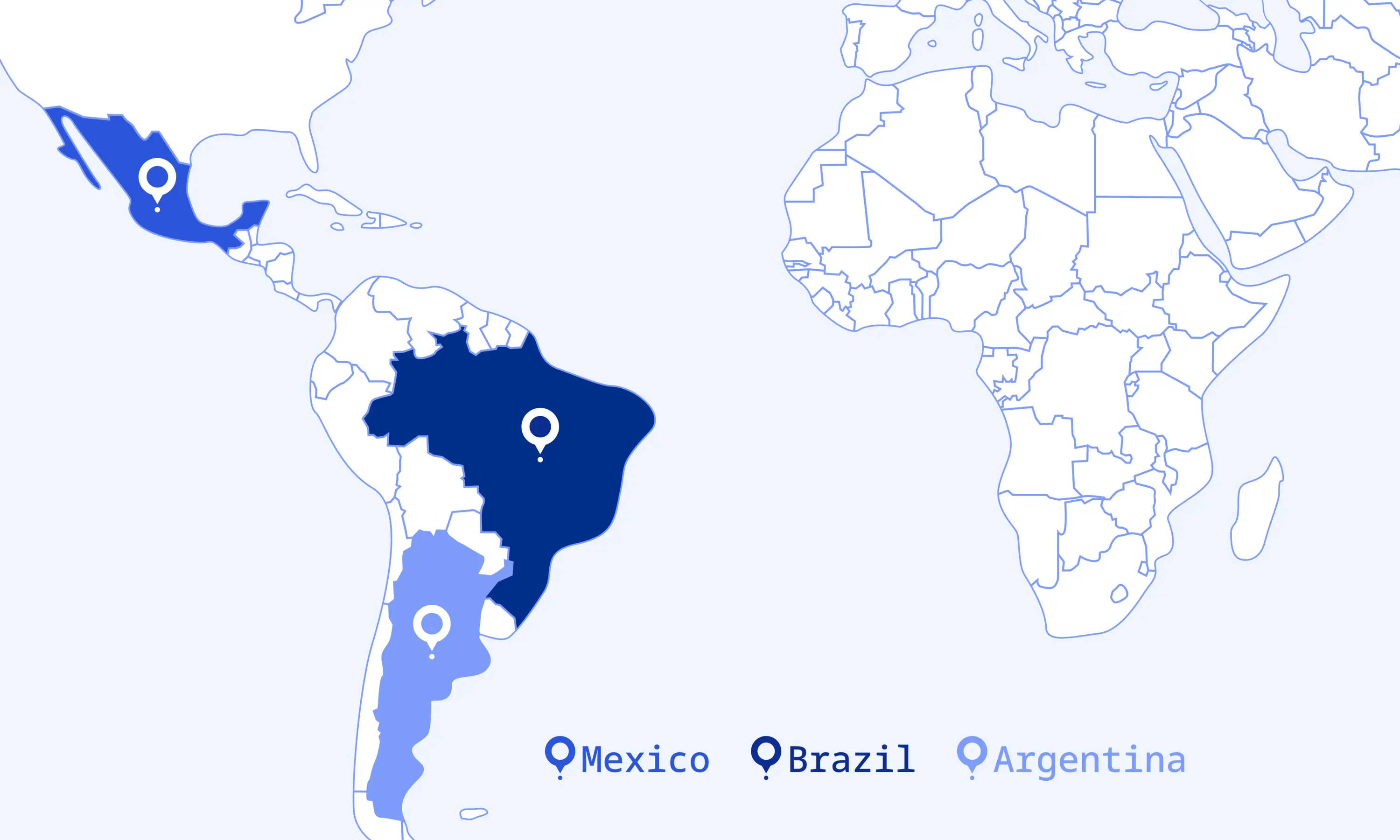
Many US-based companies find Latin America an attractive destination for outsourcing. Its nearby location and similar time zones make it easier to work together in real time than with offshore options. Countries like Mexico, Brazil, and Argentina have seen strong growth in their IT sectors. This growth comes from larger technology networks, more skilled software engineers, and government efforts to improve digital services.
Why Latin America?
- Exceptional Time Zone Alignment with the US. Mexico, Brazil, and Argentina are some of the nations with time zones that closely match or differ by only a few hours from major US cities. Communication in real time is made easy. Routine team meetings, casual conversations, and quick problem-solving meetings are easy to arrange. Teamwork, which cannot be easily formed when working remotely with offshore teams, is promoted. This coordination boosts productivity and reduces delays affecting projects on other continents.
- Rapidly Growing IT Market and Talent Pool. Latin America's IT market is following a rapid growth trajectory. Governments in the region are investing in digital infrastructure and science, technology, engineering, and math education. At the same time, a nascent startup ecosystem is attracting meaningful venture capital. This has led to a quickly growing talent base of highly qualified software developers, many of whom are eager to contribute to international projects. Economies like Mexico are witnessing the IT services industry growth. They exhibit robust growth in cloud computing, AI/ML, fintech, and cyber. Brazil has the largest tech talent pool across the entire Latin American region, with a main focus on mobile app development and the Internet of Things (IoT). Argentina is becoming a hub for artificial intelligence (AI) and cloud computing. Such development is promoted by the government and a vibrant startup culture as well.
Outsourcing software development to South America, however, presents its own set of challenges. The politics and economies of some countries are unstable and can pose a challenge, particularly for long-term projects. Certain countries experience economic transitions or political turmoil. While the transitions are not going to affect the day-to-day operations of an outsourcing team, they do bring about some uncertainty. English proficiency among Latin American software developers is improving, particularly in the main technology hubs. English proficiency can nevertheless differ significantly from nation to nation as well as within regions within a given nation.
Asia: The Cost-Effective Giant
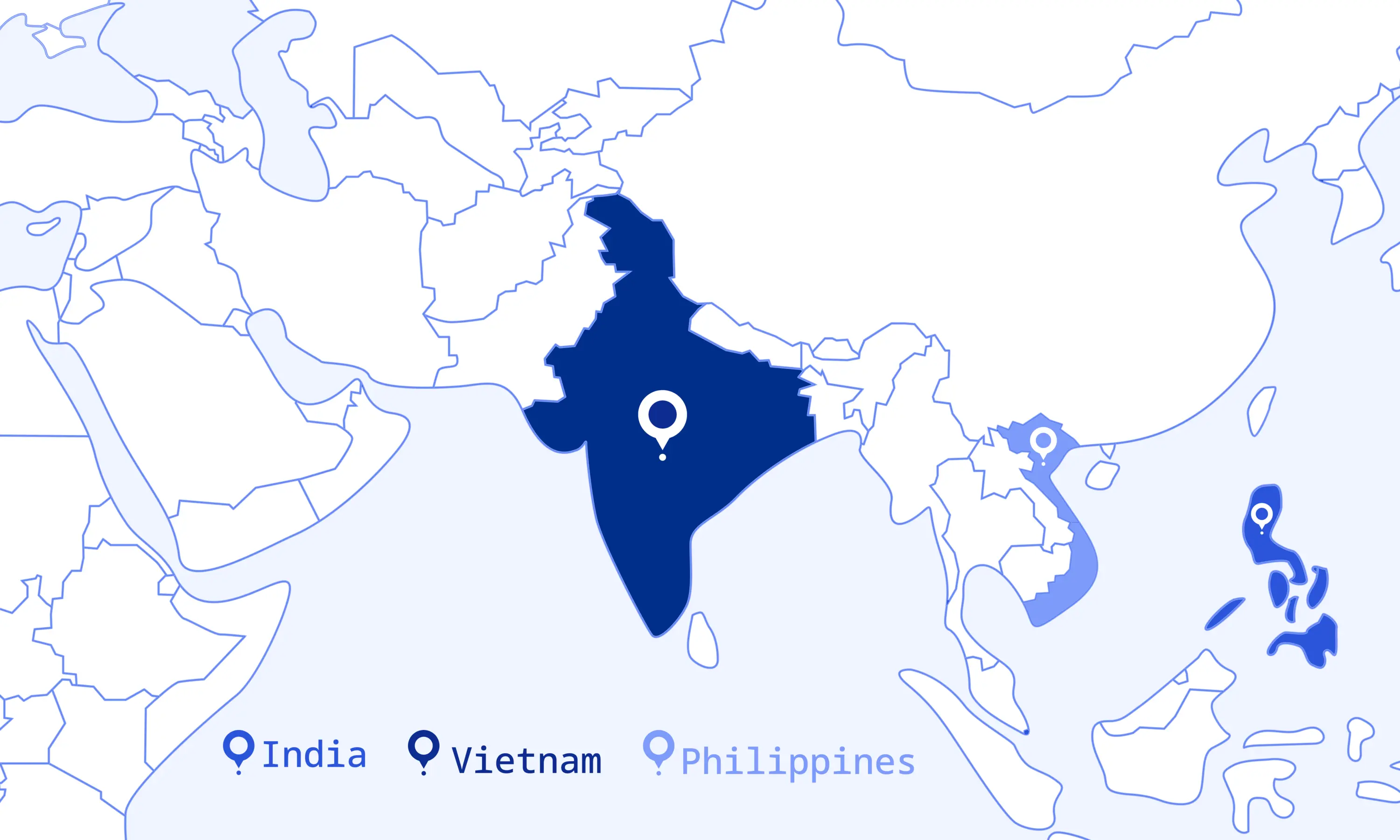
Asia offers some of the best countries for offshore software development, thanks to the region's vast talent pool and cost-effectiveness. The IT sector is robust in nations like the Philippines, Vietnam, and India. Due to their competitive pricing and wide pool of talented developers, they draw companies from all over the world. For businesses looking to lower operating expenses and gain access to a wide variety of technical skills, this area is perfect.
- Vast Talent Pool. India has the largest number of software developers in the world. The country has strong skills in custom software development, cloud solutions, artificial intelligence, machine learning, and enterprise platforms. The country holds a strong position as one of the largest IT markets worldwide, with outsourcing alone expected to reach $12.41 billion in 2025. Vietnam is quickly becoming a hub for mobile app development, frontend technologies, and quality assurance services. This happens due to its young population, who are skilled in technology. The Philippines is known for its skills in web development, support services, and UI/UX design. It often connects development teams with customer success efforts.
- Unparalleled Cost-Efficiency. The primary driver for outsourcing to Asia is often the significant cost savings. Lower labor costs and strong competition among service providers allow businesses to find high-quality development services at much lower prices than in Western markets. This cost-efficiency is particularly attractive for startups and scale-ups managing tight budgets.
Asia offers great advantages like scale and affordability for businesses. However, it's important to also recognize the drawbacks of outsourcing to this region.
- Potential Communication Barriers (Beyond Language). English skills are generally high in countries like India and the Philippines, especially in the IT sector. However, communication difficulties can go beyond just language issues. Different communication styles, cultural differences, and distinct ways of providing feedback can sometimes lead to misunderstandings or slow down decision-making.
- High Developer Turnover. In some rapidly growing Asian IT markets, the demand for skilled developers often exceeds the available supply. This leads to higher turnover rates among developers. This can lead to disruptions in projects, loss of knowledge, and higher recruitment costs for the outsourcing partner.
- Time Zone Differences. For companies in North America, the large time difference with Asian countries can make it hard to collaborate in real time. While some teams offer overnight support, primary collaboration often occurs with limited overlap.
- Quality Control & Process Maturity (Varying). Many top Asian outsourcing firms follow international quality standards. However, there is a wide range of quality and process maturity in the market. Focusing only on cost can sometimes lead to working with partners who have weaker quality assurance processes or less developed methods. This can affect project delivery and the quality of the final product.
Africa: The Emerging Market
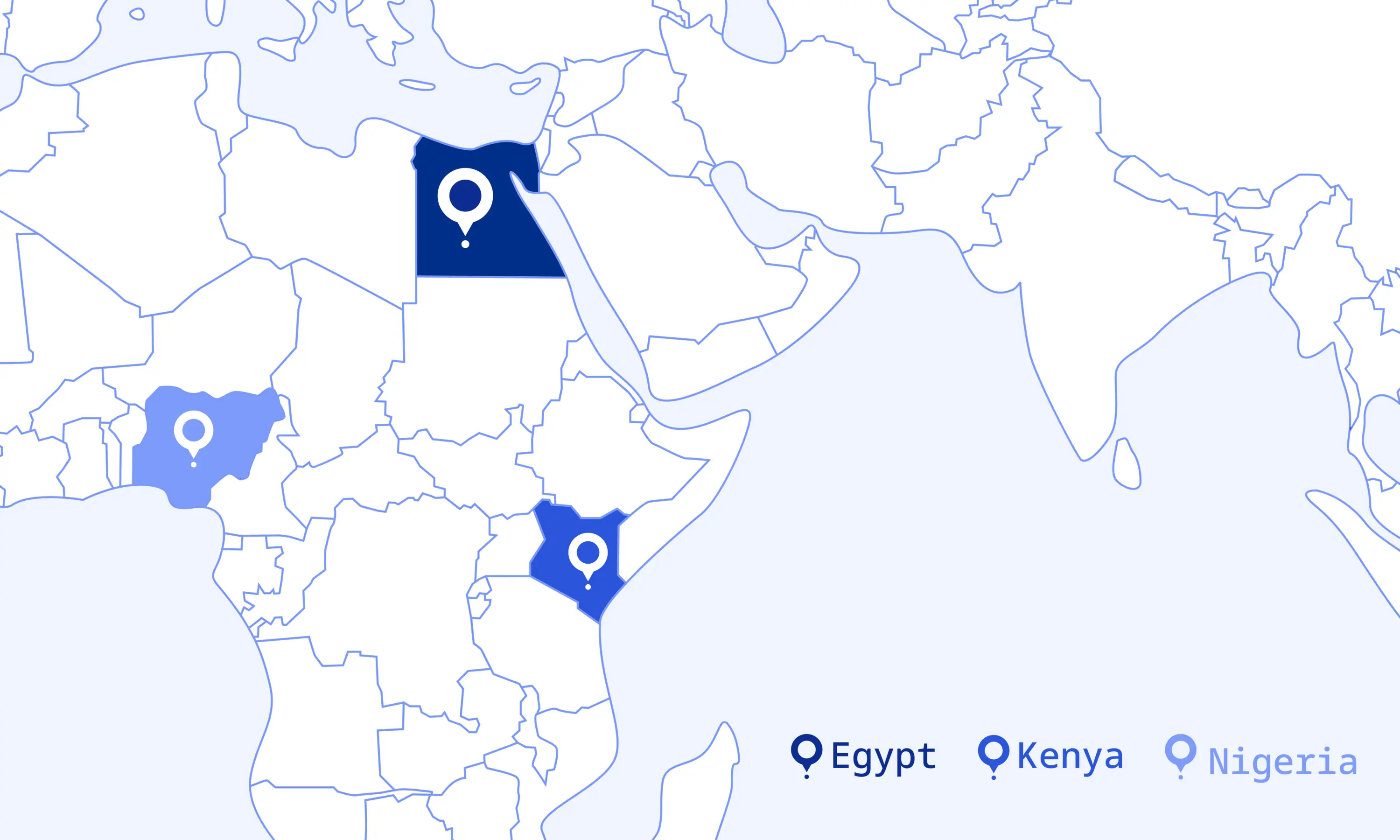
Eastern Europe and Asia have been the main places for software outsourcing for a long time. Now, Africa is quickly becoming an exciting new option. Countries like Egypt, Kenya, and Nigeria are leading the way in offering great opportunities for businesses. These countries provide a growing pool of talent, competitive prices, and better time zone overlaps for companies in Europe and North America. This region offers a fresh perspective on outsourcing. It's important to recognize how this area is developing compared to more established markets.
- Rapidly Growing Talent Pool. Africa has a young population that is skilled in technology. Many of these young people are choosing to work in software development. This creates a chance for economic growth, known as a demographic dividend. Many developers are motivated to learn quickly and enjoy working on international projects. They often think with a global perspective.
- Competitive Pricing. African countries, like other emerging markets, provide affordable software development services. This cost-saving approach helps businesses stretch their development budgets. They can hire skilled professionals for a lower price compared to many traditional outsourcing locations.
- Time Zone Advantages (Especially for Europe). Many African countries, especially in North and East Africa, like Egypt and Kenya, have minimal to no time zone differences for European clients. This makes it easier to collaborate in real time during standard business hours. For North American companies, working across time zones can be easier than with many Asian countries. This makes daily interactions simpler.
Africa stands as a continent of immense potential for software outsourcing in 2025. The company is strengthening its position in comparison to more established markets. However, this growth comes with its own challenges.
- Varying Infrastructure Quality. Internet stability and power reliability can still differ from one region or city to another in African countries, even with significant advancements. Major tech hubs usually have good resources. However, it's essential to verify this with specific providers, especially for long-term and critical projects.
- Diverse English Proficiency Levels. Many developers and IT professionals in countries like Kenya and Nigeria have strong English skills. However, it's important to check the communication abilities of each team. In Egypt, while technical skills are high, English fluency in the general population can be lower.
- Scalability for Very Large Projects. The talent pool is growing, but there may not be enough available talent for large projects that need many developers at once. This demand might not be met yet, especially when compared to the capacity of established leaders like India.
- Navigating Local Business Environments. Setting up a business in some African countries can be challenging. You will need to understand local business rules, cultural differences, and possible administrative issues. This requires extra effort during the initial setup phase. Partnering with a firm that has a solid understanding of both local and international business practices is key.
| Criteria | Eastern Europe | Latin America | Asia | Africa |
|---|---|---|---|---|
| Pricing | Medium | Medium | Low | Low |
| Talent Pool | Strong, specialized | Growing, mid-sized | Very large, diverse | Rapidly growing |
| English Proficiency | High (esp. Poland, Ukraine) | Moderate to High (varies by country) | Moderate (India high, others variable) | Moderate (improving quickly) |
| Time Zone Compatibility (US/UK) | Moderate (better for UK/EU clients) | High (good overlap with US) | Low (requires async workflows) | Moderate (varies by country) |
| Geopolitical Stability | Moderate (Ukraine varies) | Varies (some economic risks) | Varies (India stable, some volatility) | Varies (emerging market risks) |
| Cultural Compatibility | High with Europe/US | High with US | Moderate | Moderate |
Final Words
When looking at software development outsourcing in 2025, it's important to consider more than just the cost. The key takeaway remains clear: finding the "best" country is ultimately about finding the right fit for your specific needs. When choosing a team, focus on key factors. First, consider the size and skills of the available talent pool. It’s also important to have strong communication and time zone compatibility. Ensure that your intellectual property is protected by strong legal safeguards and that your team embodies your company's culture.
Successful outsourcing isn't a transactional play; it's a strategic partnership. Focusing on long-term value and clear processes will lead to better results than just trying to get the lowest hourly rate. It's important to have a shared understanding of goals. A good partner joins your team and offers more than just code. They bring valuable insights, show flexibility, and are dependable.
If you want to learn how to create a software development partnership that leads to long-term success and matches your strategic goals, contact us. Let’s talk about your next project and how we can help with your business goals.

 Read the full case study
Read the full case study
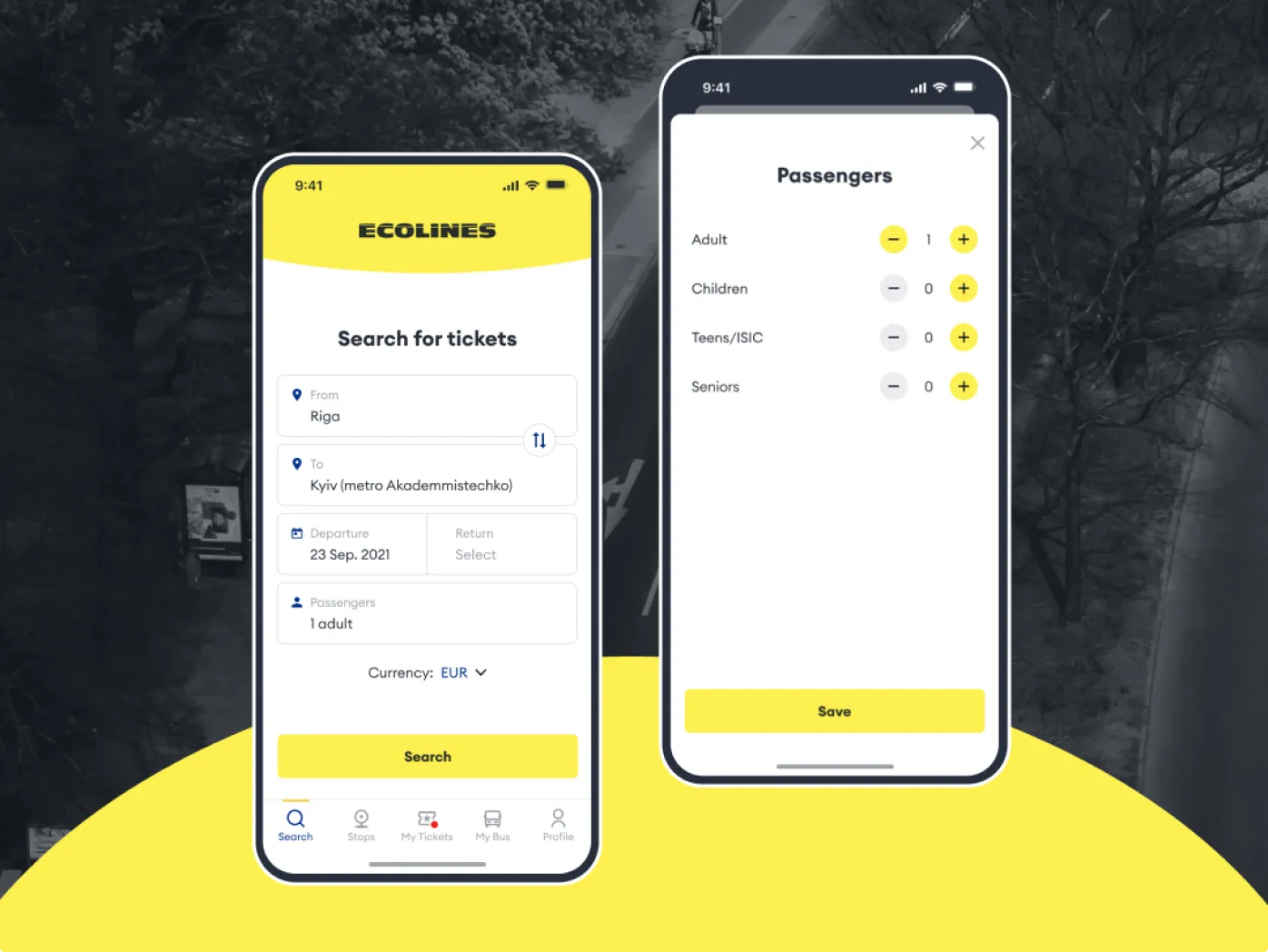 Read the full case study
Read the full case study
 Read the full case study
Read the full case study



